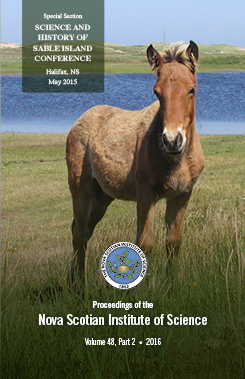Feasibility of wolf reintroduction to Nova Scotia: public opinions on wolves and their management in light of the ecological potential for wolf recovery
DOI:
https://doi.org/10.15273/pnsis.v48i2.6657Abstract
This study investigated the ecological and social potential for wolf (Canis spp.) recovery in Nova Scotia, Canada. Reintroduction potential was considered through a GIS-based analysis of land cover, human population density, land ownership, prey density, and road density. Two disconnected areas of adequate habitat for wolves were identified. Qualitative interviews were conducted with seven identified groups on public attitudes towards the wolf and its potential recovery in the province. Opinions ranged from ‘love‘ to a strong dislike of wolves, and many interviewees associated wolves with fear and expressed concern that they would come into contact with wolves on or near their properties. It would likely not be advisable to introduce an active wolf reintroduction program in NS at this time, due to the absence of effective habitat connectivity between the two identified areas of suitable habitat, and the public unease about wolf proximity. However, a proactive public education initiative is recommended in case of future reintroductions or natural immigrations of wolves and other top carnivores from nearby populations.


